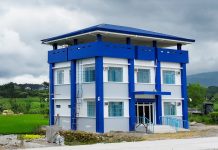Pascal Canning, 51, an Irishman, came to the Philippines on March 15, 2006, a few weeks after a landslide covered the entire village of Guinsaugon in St. Bernard, Southern Leyte. He found his wife Eden Lida from Maasin City and they married in 2008.
Like many foreigners who marry locals, Canning got used to the humdrum of rural life, until he opened a new beach hotel named Caimito.
Canning and his wife busied themselves with the day-to-day operation of the hotel, welcoming guests, foreigners and locals alike, to their resort.
Then supertyphoon Yolanda pounded Leyte and Samar on Nov. 8, 2013, killing more than 6,000 people and flattening more than 1 million houses.
Canning and his wife no longer felt comfortable spending their nights enjoying the evening sky from their newly-built villas, knowing that some 100 kilometers away, entire villages had been swept away, leaving thousands of people homeless.
Canning decided to seek help from his friends in Ireland, starting what the Star Apple Leyte Fund on Nov. 17, 2013 on Facebook.
““I am from Ireland, living in Maasin, Southern Leyte. I set up this fund to help the people from the northern Leyte rebuild their lives. Star Apple Leyte Fund was created this week by me. It is for my friends in Ireland. US people are welcome to donate. If you have a problem with it not being a registered charity, just send your money to the Red Cross, etc. Every penny we take in will be accounted for and every penny will be spent on the displaced people. We have no administrative expenses,” Canning wrote.
By Dec. 19, 2013, Canning and his crew – including his brother Gary and cousin Declan—were already moving on to their second emergency housing project in Tolosa, Leyte, after completing 31 houses in Barangay Tugas in Tabango, Leyte, some four hours drive from his hotel in Maasin City.
Canning said he chose Tabango first because he had a friend there who was married to a Filipina from the area.
“It was total wipeout of the indigent houses. We built 31 12’x10’ houses with about 42 families. The lots are owned by a farmer who donated the trees,” he said.
Choosing Tolosa also gave him no problem in terms of land ownership.
“We needed a place to build without problems. They are not squatters. The indigents have permission to build on the land,” Pascal said.
Every built house gets a house number, and costs about 200 to 300 euros to build. Donors see what their donations are buying on Canning’s Facebook page.
“I am building 30 native homes. This process starts off with the chainsaw operators cutting the fallen coconut trees into 4×4, 4×2, 3×2 and 2×2 timber. My carpenters then build a wooden framed building, 12’ x 10’ and cover in corrugated galvanized steel. The house owner then covers the floor joists with split bamboo.
The outer walls are also covered in bamboo or whatever local materials are available from the land. They do not own the land, mind you,” Canning said.
“On completion, the new home owner then gets P500 (about €8) from our funds to finish off the inside. The cost is about €200 for each house. It would be cheaper if we were not so far from our own homes in Southern Leyte. The last part of the journey can only be undertaken by 4×4 vehicles,” Pascal wrote on his Facebook page.
“Because of my experience in building and the fact that I worked with Filipino carpenters and chainsaw operators before, I could not do nothing. I also speak some of the local language and most importantly understand the people and their culture,” he said.
“After the 30 houses? As long as I have funds I aim to build these basic houses until I die. In my opinion every family deserves a basic 12’ x 10’ place to call home,” he said.
But Canning and his team have already gone beyond 30 houses.
In Tolosa, where coastal areas went underwater due to the storm surge, Canning and his crew have allocated house numbers up to 42 already.
“There are many more homeless who will be in the next batch as long as funds keep coming in,” he said.
Aside from Canning’s friends and family back in the UK helping him, he also tied up with “Taga Maasin Ka Kung (TMKK)…,” an online group mainly composed of overseas Filipino workers from Maasin City which has been doing charity work for three years.
“The funding is by donations from my friends, and friends of friends,” Canning said.
As Star Apple Fund for Leyte and TMKK for Leyte are not yet registered charities, Canning began working on a foundation.
“The SEC (Security Exchange Commission) says I need to have P1 million (about €16,900) in a bank account to start a foundation. I don’t have one million, and even if I did, they expect to leave it there for about 10 days, whilst they check that it is there. So what about the people who need shelter? Housing them is my priority,” Canning said.
“The motto of Star Apple Leyte Fund will now change from ‘I Cannot Do Nothing’ to ‘We Cannot do Nothing’. The ‘We’ is our donors and volunteers,” he said.
By Ronald O. Reyes



